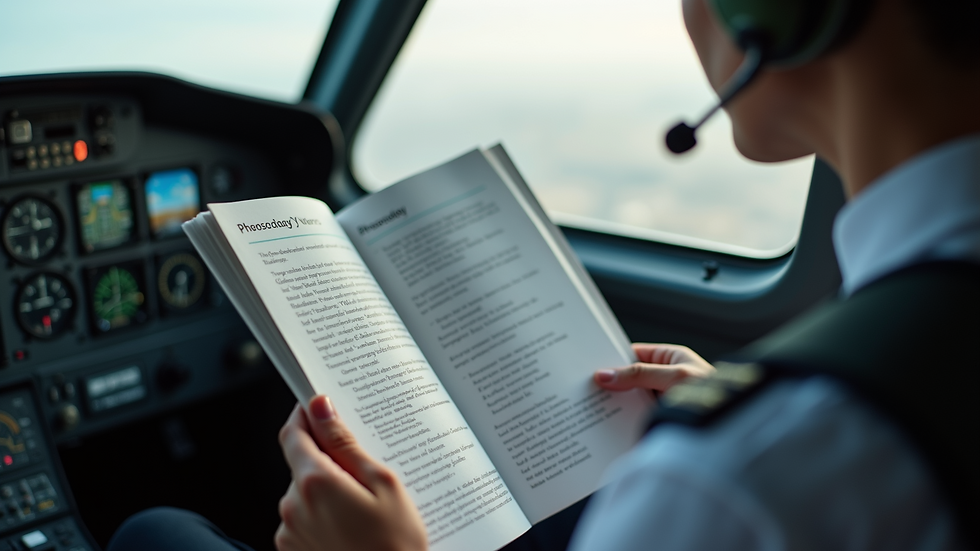The Role of Aviation English Proficiency in Safety
- Andrew Pittera
- Sep 23, 2025
- 3 min read
Updated: Nov 3, 2025
Clear communication saves lives. In aviation, every word counts. Pilots must speak and understand English fluently to ensure safety in the skies. This is why mastering aviation language skills is not just a requirement - it is a necessity.
When you fly, you rely on precise instructions from air traffic control. Misunderstandings can lead to dangerous situations. That’s why the aviation industry demands high standards in language proficiency. Let’s dive into why aviation language skills matter and how you can improve yours.
Why Aviation Language Skills Matter
Aviation is a global industry. Pilots and controllers come from different countries. English is the common language that connects them. Without strong aviation language skills, communication breaks down.
Imagine a pilot receiving a clearance to land. If the pilot mishears or misinterprets the message, the consequences can be severe. Clear, concise, and correct language prevents accidents.
Read About: ICAO English Test Preparation for Pilots
Key reasons aviation language skills matter:
Safety: Avoid misunderstandings that can cause accidents.
Efficiency: Smooth communication speeds up operations.
Compliance: Meet international regulations and standards.
Career growth: Open doors to global job opportunities.
Improving your aviation language skills means you can respond quickly and accurately. It means you can handle emergencies calmly. It means you can work anywhere in the world.

How to Develop Strong Aviation Language Skills
You can’t just rely on everyday English. Aviation language skills require specific training. Here’s how to build them effectively:
Enroll in specialized courses. Look for programs focused on aviation English. They teach you the vocabulary, phrases, and pronunciation used in aviation.
Practice listening and speaking. Use recordings of real ATC communications. Repeat phrases aloud to improve fluency.
Learn standard phraseology. Memorize the official phrases used in air traffic control. This reduces confusion.
Take mock tests. Simulate ICAO English certification exams to prepare.
Get feedback. Work with instructors who can correct your mistakes and guide your progress.
By following these steps, you’ll gain confidence and competence. You’ll be ready to pass your ICAO English certification and fly safely.
Which type of English is used in aviation?
Aviation uses a specialized form of English known as Aviation English. It is a simplified, standardized version of English designed for clarity and brevity.
This English focuses on:
Standard phraseology: Fixed expressions for common situations.
Clear pronunciation: Avoiding accents or slang that cause confusion.
Concise communication: Short, direct sentences.
Technical vocabulary: Words related to aircraft, weather, navigation, and emergencies.
The International Civil Aviation Organization (ICAO) sets the standards for Aviation English. Pilots must reach at least Level 4 on the ICAO scale to operate internationally. This ensures everyone speaks the same language, literally.

The Impact of Aviation English Proficiency on Safety
Strong aviation English proficiency directly improves safety. When pilots and controllers understand each other perfectly, errors drop dramatically.
Consider these examples:
A pilot correctly understands a clearance to change altitude, avoiding collision.
A controller quickly comprehends a pilot’s emergency call and provides immediate assistance.
A crew member reads weather updates accurately and adjusts the flight plan.
Poor language skills can cause delays, confusion, and accidents. The aviation industry has documented cases where language barriers contributed to incidents.
That’s why investing in your aviation english proficiency is crucial. It’s not just about passing a test. It’s about protecting lives and ensuring smooth operations.
Practical Tips to Maintain and Improve Your Aviation Language Skills
Once you achieve your ICAO English certification, don’t stop learning. Language skills can fade without practice. Here’s how to keep sharp:
Listen daily: Tune into live ATC feeds or aviation podcasts.
Speak regularly: Join pilot forums or language exchange groups.
Read aviation materials: Manuals, reports, and news articles.
Use flashcards: Memorize key phrases and vocabulary.
Take refresher courses: Online platforms offer flexible options.
Consistency is key. Even 10 minutes a day can make a big difference. Keep your skills fresh to stay safe and confident.

Your Next Step Toward Aviation Language Mastery
Mastering aviation language skills is a journey. It requires dedication and the right resources. If you want to get your official ICAO Aviation English certification quickly and affordably, start with a trusted online platform.
English4Aviation offers tailored courses designed for pilots like you. Their expert instructors focus on practical skills and exam preparation. You’ll gain the confidence to communicate clearly and meet regulatory requirements.
Don’t wait. Your career and safety depend on it. Take control of your aviation language skills today and fly with confidence tomorrow.
Read About: What to Expect in the ICAO English Exam



Comments